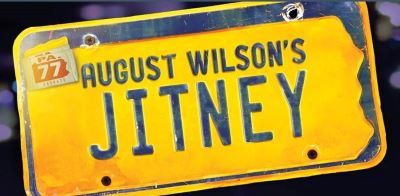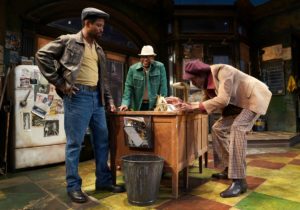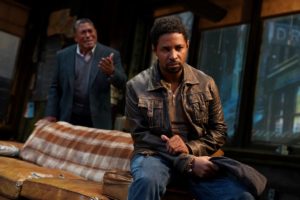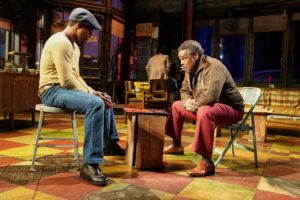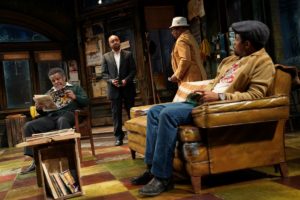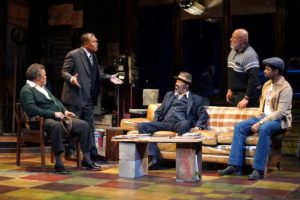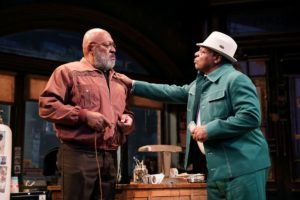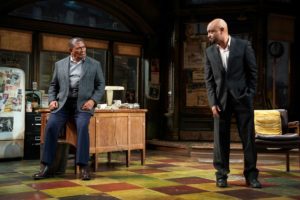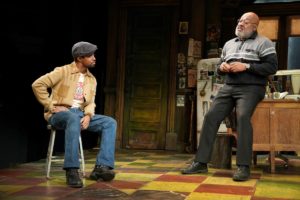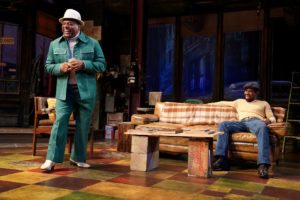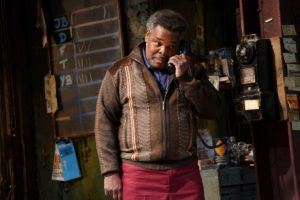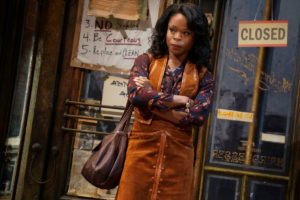JUMP FOR JITNEY
It is an incontestable fact that every play August Wilson wrote justifies being looked at again and again. It has been fascinating to see how the moral, political and emotional life of African-Americans has been given the sweep of history by concentrating on the ten decades of a tumultuous century and how far-reaching their truths seem, despite the fact that most of them take place in a relatively small area, the Hill District of Pittsburgh, that would seem to limit rather than expand the horizons of such a bold undertaking, but which, in fact, do just the opposite.
An event of epic proportions would be to do all ten plays in the cycle in a single season, created by passionate and committed artists who may indeed be forever indebted to the legacy these plays have given them, in much the same way that the Druid Theatre Company of Galway, under the inspired direction of Garry Hynes, has dedicated whole seasons to the works of John Millington Synge and Tom Murphy. I look forward to it happening in my lifetime and not just because of the social and artistic significance of such an event but because Wilson’s language soars, because he has taken the cadences of African-American speech and transformed them into poetry, in much the same way that Clifford Odets took the rhythms of Jewish immigrants and found in them a peculiarly American vernacular or the way Sean O’Casey took the common speech of the Irish and created from it an elevated ripeness of heartfelt rage and sorrow that has practically become the Anglicized Gaelic we all think of today as Irish.
Jitney, which opens this Sunday, November 24, at the Mark Taper Forum in Los Angeles, was probably not intended to be a part of such an ambitious cycle when Wilson wrote it in 1979; it was his first play and, in every way, a contemporary play, taking place during the very time in which it was written. It didn’t really get the recognition it deserved for two decades and, then, probably because we were already being tuned into the ambitiousness of Wilson’s overall scheme. But, at its best, it reaches the magisterial heights of the plays in the cycle to which audiences had most fully responded to: Fences, Joe Turner’s Come and Gone, Ma Rainey’s Black Bottom, and The Piano Lesson.
There is complexity and poignant depth to its portrait of a group of men working for a gypsy cab company during a period of new possibilities for African-American men in our society. Opportunities open to these men that they can either take a calculated chance on or forever wish they had. There is only one woman in Jitney, but she, despite giving into the man she loves, is a fully realized character, pushing forward, perhaps in ways more defiantly courageous than any of the men in the play. Her scenes are brief but memorable.
The fact that a gun appears in the first act promises that, in true Chekhovian style, it will go off in the second act. The fact that it doesn’t may be a purposeful rebuke to Chekhov; what contemporary playwright doesn’t owe something to Chekhov and, at the same time, want to run away from his influence? Bad playwriting? Or brave new playwriting? I choose the second possibility. It is very much in Wilson’s favor that he eschews the predictable. These are real people in real situations, acting very much like real people, which gives them their humanness: they are capable of seeming foolish, funny, ruminative, aggressive, contradictory, right, wrong, impulsive, sometimes afraid to stir but always alert. These are people you learn to love, because, in a sense, they are you. Perhaps, to Wilson, that was Chekhovian enough.
They are also great storytellers and that simple fact gives Wilson his great authority as a playwright: he, thanks to them, becomes a great storyteller himself, and it is in his stories that gritty metaphors become things of beauty, which, in turn, define the characters of those who tell the stories. And, in the theater, the task of an actor telling a story is to tell us as much about himself in the process as it is in making the story vivid. From where, inside the character’s very essence, does the story come from?
That’s why we’re lucky this production from Manhattan Theatre Club is directed by Ruben Santiago-Hudson; he directed the Broadway version of Jitney and knows every rhythm and cadence of the show. The cast: Francois Battiste, Harvy Blanks, Amari Cheatom, Anthony Chisholm, Brian D. Coats, Steven Anthony Jones, Nija Okoro, Keith Randolph Smith and Ray Anthony Thomas.
Jitney
Manhattan Theatre Club production
Center Theatre Group’s Mark Taper Forum
Music Center, 135 N. Grand Ave
ends on December 29, 2019
for tickets, call 213.628.2772 or visit CTG
